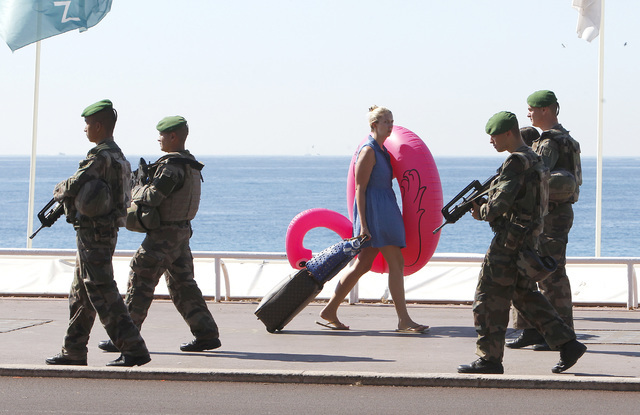Making sure refugees have jobs helps reduce terrorist threats

Tourist guides and magazines and newspapers my wife and I browsed about Nice, France, the largest and most visited resort on the French Riviera, made no mention that we would see them there.
We saw them on main streets and side streets. On beaches and at marinas.
French commandos carrying automatic weapons.
It was just before Christmas 2014, when we visited the stunning coastal mecca, where we realized soldiers would always be part of our vacation. Instead of feeling safer, we wondered whether we’d be caught in a firefight.
I asked a tour operator whether the soldiers would be an extra charge and he didn’t laugh. I didn’t either.
Here I had flown thousands of miles with benign prostatic hyperplasia, an enlarged prostate — I’m sure I set a record for trips to the bathroom on a trans-Atlantic Delta flight. I’d also spent thousands of dollars to go somewhere I needed to be protected by commandos.
I kept wishing I had had my M-16 from the Vietnam War with me.
My wife would need sleeping pills to nod off.
Sadly, less than two years after we visited Nice — July 16, 2016, to be exact — French soldiers who had been patrolling the coastal mecca couldn’t prevent a terrorist from mowing down 84 people with a big truck on the Promenade des Anglais, a seafront walk.
I doubted they could. Unless the “lone wolf” sickos who engage in terrorist acts open their mouths to the wrong people, it’s almost impossible to stop them.
During our trip to Nice, we assumed, correctly, that the show of force by soldiers was the result of intelligence operatives learning France was targeted for terrorist attacks.
Less than a month after our 2014 visit, terrorists perpetrated a mass shooting at the office of the satirical magazine Charlie Hebdo in Paris. Later, in 2015, 130 people were killed in Paris in the deadliest terrorist attack in French history.
If the soldiers in Nice were supposed to give us a sense of security, they didn’t. The more I talked with people and learned about the area — my wife didn’t join me for trips into gritty ghettos — the more convinced I was that Nice would face some kind of attack.
During my outings alone in Nice, I found myself acting as a journalist, even though I was then in graduate school. I ran into an immigrant from Tunisia, who answered my questions in broken English.
He had a degree in art history but felt good that he had gotten a job in a cafe busing tables.
He showed me around dilapidated public housing. Unemployment was running as high as 40 to 50 percent among those there, he said, which corresponded to internet research I was doing. He said the lack of jobs left people hopeless and angry.
If looks could kill as he gave me a tour that tourists seldom get, I would have died several times. The Tunisian said I looked like someone from the government.
Without jobs, the Tunisian said, migrants and refugees will make only trouble in a country.
In online research, I found that since 2011, security experts called the French Riviera a “jihadist breeding ground,” with dozens of Muslims in France going off to fight with the Islamic State in Syria.
The key to not turning refugees into radicals in your country, the Tunisian said, was making sure they learned the language and had jobs.
Since 2001, according to the National Consortium for the Study of Terrorism and Responses to Terrorism, 250 people have been killed by terrorists in France.
By comparison, 2,902 Americans died in the Sept. 11, 2011, terrorist attacks.
The Tunisian said people blow the terrorist threat out of proportion.
He was right. As Andrew Shaver of Princeton University noted, on the day of the Paris attacks cancer killed three times as many French people as the terrorists did.
And since the 9/11 attacks in the U.S., Americans were just as likely to be crushed to death by falling TVs and furniture as they were to die of terrorism.
Still, I wondered, does it make sense to spend thousands of dollars and travel across the ocean only to have gun-toting commandos protecting me at every turn?
That doesn’t sound like a vacation to me.
Paul Harasim’s column runs Sunday, Tuesday and Friday in the Nevada section and Thursday in the Life section. Contact him at pharasim@reviewjournal.